

Asia pacific aircraft storage. Nortgern australia investment forum. Fulbright Program. The Fulbright Program is one of the most prestigious awards programs worldwide, operating in over 155 countries.[1] Fifty-three Fulbright alumni have won Nobel Prizes;[2] seventy-eight have won Pulitzer Prizes.[2] The program was established to increase mutual understanding between the people of the United States and other countries through the exchange of persons, knowledge, and skills.
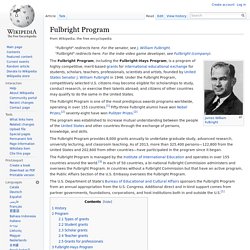
The Fulbright Program provides 8,000 grants annually to undertake graduate study, advanced research, university lecturing, and classroom teaching. As of 2013, more than 325,400 persons—122,800 from the United States and 202,600 from other countries—have participated in the program since it began. David Cameron: Fifa scandal must prompt corruption purge - BBC News. Prime Minister David Cameron is urging a global crackdown on the "cancer" of corruption in the wake of Fifa bribery allegations.
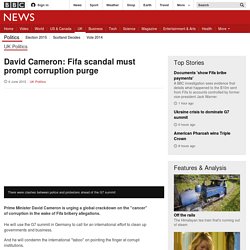
He will use the G7 summit in Germany to call for an international effort to clean up governments and business. And he will condemn the international "taboo" on pointing the finger at corrupt institutions. Fourteen people have been charged by the US over alleged corruption at world football's governing body. The US justice department alleges that the 14 accepted bribes and kickbacks estimated at more than $150m (£97m) over a 24-year period. Breaking taboos. Emergency earthquake response teams australia. Australian nepalese nurses. Surveillance Australia. Surveillance Australia Pty Ltd is an Australian aviation company.
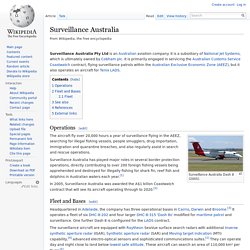
It is a subsidiary of National Jet Systems, which is ultimately owned by Cobham plc. It is primarily engaged in servicing the Australian Customs Service Coastwatch contract, flying surveillance patrols within the Australian Exclusive Economic Zone (AEEZ), but it also operates an aircraft for Tenix LADS. Operations[edit] Surveillance Australia Dash 8 (2005). ABC launches web portal in China called Australia Plus. The ABC has partnered with a Chinese media company to open a web portal for Australian content in that country, becoming the first mainstream media organisation to launch a registered web portal in China.
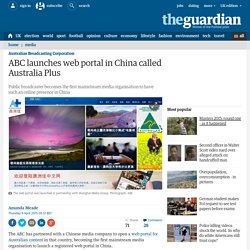
Parliament of the World's Religions. Chicago Meeting, 1893 There have been several meetings referred to as a Parliament of the World's Religions, the first being the World's Parliament of Religions of 1893, which was an attempt to create a global dialogue of faiths.
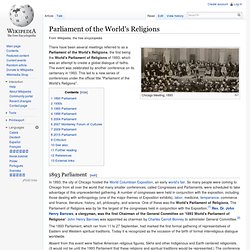
The event was celebrated by another conference on its centenary in 1993. Her Majesty's Diplomatic Service. Her Majesty's Diplomatic Service (HMDS) is the diplomatic service of the United Kingdom of Great Britain and Northern Ireland, dealing with foreign affairs, as opposed to the Home Civil Service, which deals with domestic affairs.
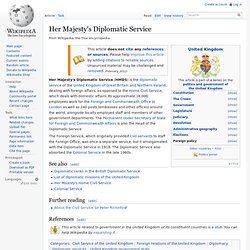
Its approximate 16,000 employees work for the Foreign and Commonwealth Office in London as well as 240 posts (embassies and other offices) around the world, alongside locally employed staff and members of other government departments. The Permanent Under-Secretary of State for Foreign and Commonwealth Affairs is also the Head of the Diplomatic Service. The Foreign Service, which originally provided civil servants to staff the Foreign Office, was once a separate service, but it amalgamated with the Diplomatic Service in 1918.
United States Foreign Service. The flag of a U.S.
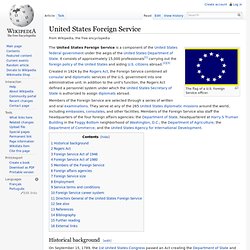
Foreign Service officer. The United States Foreign Service is a component of the United States federal government under the aegis of the United States Department of State. It consists of approximately 15,000 professionals[1] carrying out the foreign policy of the United States and aiding U.S. citizens abroad.[2][3] European External Action Service. 'Grave concerns' over Australia asylum centre - top rights official. Prisoners Abroad - Home - Caring for Britons held overseas. Australia network. Goethe-Institut. Goethe Institut Kuala Lumpur Goethe-Institut, Prague Goethe Institut Oslo Library of the Goethe-Institut Philippines The Goethe-Institut (GI) (German: [ˈɡøːtə ɪnstiˈtuːt]; English: Goethe Institute) is a non-profit German cultural association operational worldwide with 159 institutes, promoting the study of the German language abroad and encouraging international cultural exchange and relations.
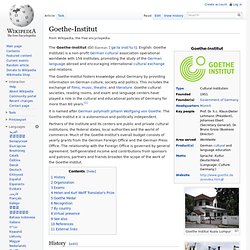
The Goethe-Institut fosters knowledge about Germany by providing information on German culture, society and politics. It is named after German polymath Johann Wolfgang von Goethe. Department of Foreign Affairs and Trade (Australia) The Australian Department of Foreign Affairs and Trade (also called DFAT) is a department of the Government of Australia charged with the responsibility of advancing the interests of Australia and its citizens internationally.
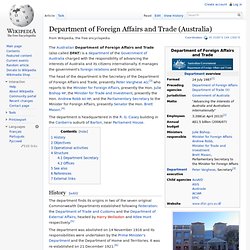
It manages the government's foreign relations and trade policies. The department is headquartered in the R. G. News - World. Her Majesty's Diplomatic Service. United Nations Mission in East Timor. The United Nations Mission in East Timor (UNAMET) was established by Security Council Resolution 1246 on 11 June 1999 for a period up to 31 August 1999.[1] By Security Council Resolution 1257 of 3 August UNAMET was extended to 30 September 1999.[2] Mandate[edit] To organize and conduct a popular consultation on the basis of a direct, secret and universal ballot, in order to ascertain whether the East Timorese people accept the proposed constitutional framework providing for a special autonomy for East Timor within the unitary Republic of Indonesia or reject the proposed special autonomy for East Timor, leading to East Timor’s separation from Indonesia, in accordance with the General Agreement and to enable the Secretary-General to discharge his responsibility under paragraph 3 of the Security Agreement.
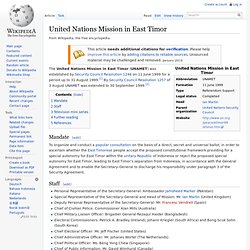
Staff[edit] International Staff: current deployment = 210 (full deployment = 242) Civilian Police: current deployment = 271 (fully deployed) Television mini series[edit] Further reading[edit] United Nations Transitional Administration in East Timor. The United Nations Transitional Administration in East Timor (UNTAET) provided an interim civil administration and a peacekeeping mission in the territory of East Timor, from its establishment on October 25, 1999,[1] until its independence on May 20, 2002, following the outcome of the East Timor Special Autonomy Referendum. A coalition of nations sent troops to support the peace keeping mission. The forces were led by Australia, which provided the largest contingent and the out of theatre base for operations, supported by New Zealand, who sent the second largest contingent, and took responsibility for the more volatile southern half of the main border, France, whose special forces joined the ANZACs on the first day, as well as contingents from Argentina, Brazil, Chile, Denmark, Fiji, Ireland, Japan, Malaysia, Russia, Singapore, South Korea, Thailand, the Philippines, Portugal, Sweden, and the United Kingdom.
Initial administrative structures[edit] First Transitional Administration[edit] Category:Foreign relations of Australia. Young Artists Shine At Hong Kong’s Asia Contemporary Art Show : www.newsstandonline.net. NewsStandOnline.Net (9-October-2013): With artwork sprawled on queen-sized beds, hung in front of television sets and even placed on toilet counters, Hong Kong’s Asia Contemporary Art Show has an unusual take on what constitutes an art gallery. Hosted in a luxury hotel, the bi-annual fair caters for emerging artists hoping to break into global markets and the unorthodox venue is an attempt to reduce costs in a city fast becoming known as an international arts hub but where sky-high rents pose a challenge for artists and galleries.
In an unusual take on what constitutes an art gallery, artists shine at Hong Kong contemporary art show. You are here: Home / In an unusual take on what constitutes an art gallery, artists shine at Hong Kong contemporary art show HONG KONG (AFP).- With artwork sprawled on queen-sized beds, hung in front of television sets and even placed on toilet counters, Hong Kong’s Asia Contemporary Art Show has an unusual take on what constitutes an art gallery.
Hosted in a luxury hotel, the bi-annual fair caters for emerging artists hoping to break into global markets and the unorthodox venue is an attempt to reduce costs in a city fast becoming known as an international arts hub but where sky-high rents pose a challenge for artists and galleries. Thousands attended the four-day show, which emphasises young and mid-career artists and is the city’s second-largest art fair after the Hong Kong edition of the prestigious Art Basel. Peace at last for souls lost in war. Historians Derrill de Heer (left) and Bob Hall. Photo: Alex Ellinghausen THEY are called wandering souls, and there are 3906 of them, mourned by families who don't know where they are buried. Until they know, they believe the spirits of the dead will wander in torment. But Australians know, because they killed the 3906 and logged where they buried them in fields, jungles and rubber plantations.
Australian agriculture has 'supermodel syndrome': Marketing expert - ABC Rural. Updated Fri 13 Jun 2014, 12:08pm AEST Australian agriculture is suffering from a ‘supermodel syndrome’ and urgently needs to rethink its approach to marketing and selling itself. That is the view of leading advertising expert Craig Davis, who has worked with brands like Toyota and Coca-Cola. Secret Intelligence Service. It is frequently referred to by the name MI6 (Military Intelligence, Section 6), a name used as a flag of convenience during the First World War when it was known by many names.[2] The existence of MI6 was not officially acknowledged until 1994.[3] HSC Manannan. HSC Manannan is a 96-metre (315 ft) wave-piercing high-speed catamaran car ferry built in Tasmania in 1998. International Force for East Timor. Major General Peter Cosgrove (right) Australian commander of the United Nations backed peace keeping operation (INTERFET) to East Timor. HSC Hai Xia Hao.
Hai Xia Hao is a passenger / vehicle ferry operated by Fujian Cross Strait Ferry between Taichung and Pingtan Island. Australia Network. Australia Network, originally Australia Television International and later ABC Asia Pacific, is a free-to-air international satellite television service operated by the Australian Broadcasting Corporation since 2006.[2] The television and online service broadcasts 24 hours a day on 7 days a week, to approximately 44 countries in Asia, the Pacific and the Indian sub-continent. The channel broadcasts a mix of programming, including lifestyle, drama, sports, English-language learning programs, children's programming and news and current affairs. Environment. See our initiatives. Australia Network. Why South African whites are coming home. Native Americans in the United States.
Waikato Institute of Technology. School in the cloud: Children with mentors on the other side of the world. 24 April 2014Last updated at 20:04 ET By Alison Gee BBC World Service Five years ago, an Indian schoolboy struck up an unlikely friendship with a retired teacher in London - and with her help he is now studying to be a doctor. Mongolia.
Hôpital Français de Hanoi. Japan and Australia agree trade deal. Cambodia: Ancient Angkor temples added to Street View. Sydneysiders break down cultural barriers at nationwide launch of The Welcome Dinner Project. Planned high-speed rail by country. Outsourcing jobs to new zealand.